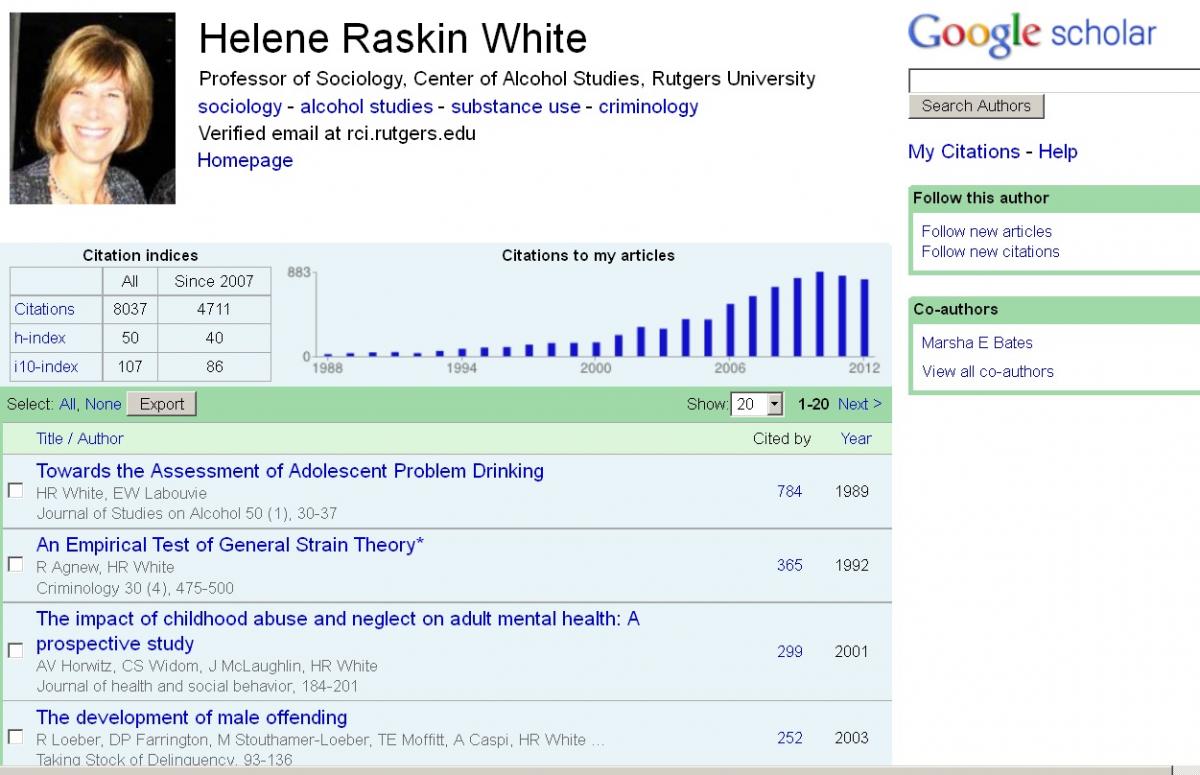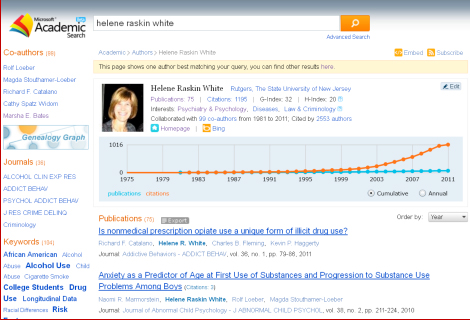Creating and Boosting Academic Profiles with Google Scholar Citations and Microsoft Academic Search
By Judit Ward
Since its inception, a small research library at Rutgers University, the Center of Alcohol Studies Library, has had the privilege to provide far-reaching services to its core users, the Center’s faculty. Recent developments in the efforts to increase scholars’ visibility in the academic community, such as Google Scholar Citations (http://scholar.google.com/citations) and Microsoft Academic Search (http://academic.research.microsoft.com), prompted the Library to take up a new task and offer assistance in creating, maintaining, and improving researchers’ profiles online.
Working closely with CAS researchers to assess scholarly performance as represented via available metrics, the Library evaluated a variety of bibliometric tools in an earlier project. By locating and analyzing researchers’ profiles in subscription and free databases, we identified discrepancies between reality and online representation. Some of the providers of these metrics were willing to work with us and corrected the inaccuracies whether they were name variation issues, cataloging or indexing mistakes, or any minor errors. Other tools and sources, however, were labeled as ‘need constant attention’ by us, especially the ones collecting data from anywhere on the Internet, such as Microsoft Academic Search and Google Scholar Citations.
The academic community benefits largely from web-based academic search engines, since they crawl and index files of any scholarly articles on the Internet, and allow conducting searches independently from publishers and their databases. However, academic performance indicators, such as citation counts and the h-index rely heavily on input data. The Library started to experiment with these tools to reflect the Center’s scholarly performance more accurately in the academic community. The original goal was to raise awareness of online profiles and problems related to them, but we ended up with a new service. As requested by our faculty, now we help them create and modify their online researchers' profile in Google Scholar Citations and Microsoft Academic Search. This task also entails short, one-on-one training sessions for researchers and their assistants to maintain profiles as precise as possible. Junior researchers also appreciate our help as they discover options to become more visible and get cited more often.
Recently Microsoft launched a new function for scholars called Microsoft Academic Search. The tool is based on data collected from any page on the web and then organized in a searchable database with many features, such as trends, maps, co-author-path, citation graph, etc. However, the graphs and charts are as good as the data they rely on. Researchers have no influence on what is indexed on the web and how their basic profile is created in Microsoft Academic Search. At the initial phase of setting up a profile however, Microsoft Academic Search has an option to request some changes with a Microsoft account, such as merging records and profiles from the same author. At the beginning of the year, the CAS Library took the initiative and requested merges for each CAS researcher. Now, instead of three to six different profiles for the same researcher with an individual bibliography, citation count, and h-index, based on the automated search engine results, there is only a single author profile. The Microsoft Academic Search record now contains current contact information, a photo, and a link to the researcher’s profile on the CAS home page too. Current researcher profiles are still incomplete and missing a lot of citations. The subject terms, selected by Microsoft, cannot be changed either.
The other resource for researchers, Google Scholar Citations, has gained popularity after Google had expanded its initially limited offer. Currently anyone can create a researcher profile and keep track of citations and other metrics. With this tool, the emphasis is on creating it on one’s own. Unlike the Microsoft product, with Google Scholar Citations, the researcher has to initiate setting up a profile with a free Google account, and either continue to create the profile or provide access to an assistant. In a few simple steps, the creator can select the appropriate articles retrieved with a Google Scholar search by confirming records that match the bibliography. The Google Scholar Citations profile features an option to add to the bibliography manually and create a more comprehensive profile. More detailed instructions are available at: http://scholar.google.com/intl/en/scholar/citations.html.
We have found that the new Microsoft Academic Search tool shows significantly fewer articles for every researcher, and consequently has lower citation counts and h-indices than Web of Science or Google Scholar. The examples present a highly cited CAS researcher, Dr. Helene Raskin White’s pages in Microsoft Academic Search and Google Scholar Citations. Based on our previous bibliographic investigations into Dr. White’s citations, we can claim that the Microsoft Academic Search metric is far from being accurate. As of October 2012, the total number of publication written by Dr. White, according to Microsoft Academic Search, is 75, cited 1195 times, which yields to an h-index of 20.
To put the Microsoft Academic Search data into context, in the Web of Science databases one will find 131 articles written by Dr. White. The citation report shows 3933 citations (three times more than in Microsoft Academic Search) and an h-index of 33. In comparison, a quick author search in Google Scholar retrieved 324 publications for Dr. White. The inflated number is partly explained by several inaccurate attributions, confirmed by Dr. White, and duplicate records, and partly by the fact that Google Scholar also counts books and book chapters as separate records. After omitting duplicates and wrong records, the citation counts are still slightly higher than in Web of Science. This analysis can be done by downloading and installing software applications that draw data from Google Scholar, such as Publish or Perish (http://www.harzing.com/pop.htm) or the Scholarometer extension to Firefox (http://scholarometer.indiana.edu). In our experience, the author’s contribution is absolutely necessary to clean up the data before any analysis.
The CAS Library also monitors the citation trends of articles written by CAS authors. We have found that collecting data periodically on a frequently cited article in multiple databases an excellent way to compare metrics in various databases. For example, a search on Dr. White’s most highly cited article (Towards the assessment of adolescent problem drinking, Journal of Studies on Alcohol, 1989) retrieves 784 citations in Google Scholar, 560 in Web of Science, and only 269 in Microsoft Academic Search. The highly inflated figure in Google Scholar Citations and the low count in Microsoft Academic Search can be considered further proof of inaccuracies in the underlying database.
The CAS Library strives to assist researchers to regain some influence over their online profiles and to provide more visibility to research at the Center. On the other hand, a better understanding how bibliographic tools work also serves faculty in their roles on promotion and grant reviewing committees. In our efforts, we are following the steps of the best in the documentation and dissemination of information in the field of substance abuse.

Dr. Helene Raskin White’s profile in Google Scholar Citations

Dr. Helene Raskin White’s profile in Microsoft Academic Search
Judit Ward is Director of Information Services, Center of Alcohol Studies, Rutgers University.
